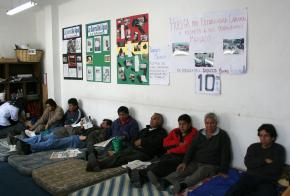Hunger strike in Cochabamba
In Cochabama, Bolivia, factory workers and union leaders began a hunger strike in July to protest management abuses and deteriorating conditions at the Manaco shoe factory, a subsidiary of the Canadian-based global conglomerate Bata. Among the hunger strikers is the well-known Bolivian unionist and global justice leader Oscar Olivera.
Eleven days into the hunger strike, the following statement was issued in the name of the National Confederation of Bolivian Workers and the Factory Workers Federation of Cochabamba.
THIS HUNGER strike picket has brought to light a problem that is common among all Bolivian factory workers who find ourselves defenseless and, as we did in April 2000 and October 2003, have raised our voice against the injustice and have acted with dignity.
An agreement has been reached for our comrade Alejandro Saravia that is less unjust than what the company was originally trying to get away with. This, as we said, does not mean, however, that this problem of life and of livelihood will be solved with a few coins. We reserve the right to continue protesting against the violation of rights, not only for those of Alejandro, but also for those of many more Manaco workers. Alejandro today received a minimum compensation for his 28 exemplary years of work in this factory.
We have achieved this in the way we know how, in our own way, with the mobilization of the rank-and-file workers of other factories, with our hunger strike, in order to ensure that these companies will not continue to get away with lying and exploiting. We have seen in this conflict the desperation, the fear, and the lies of the company, which to this day is still requiring its workers to choose between hunger and renouncing their rights as workers.

And we acted alone against the company, due to the fact that the Manaco union, which once made us proud, is today a refuge of a group of traitors who are servants of management. The Federation of Factory Workers of Cochabamba and the General Confederation of Bolivian Workers do not recognize a union incapable of fighting for consistent work and the well-being of their membership...They should be lackeys and foremen, not union leaders.
Nor can it be said that the government came to our defense. Two days of tensions and agreements are not worth anything: neither the Departmental Administration of Labor nor the Labor Minister resolved the conflict, nor did they support Alejandro Saravia in his just demands. What was gained was rather our collective success. Given that all they did was hide and make agreements behind the backs of those affected, it would have been better if they had not come at all. At least now we can understand the labor politics of this government "of change" and are not expecting anything from it, because it appears to be a continuation of its predecessors.
Would that the Manaco corporation nor any company in Bolivia feel at ease, because we are beginning to fight for our brothers and sisters who are today hostages of their trickery and because the forms of struggle and claiming of our rights are more alive today than ever, as our hunger strike and protests show. And if today we lift this hunger strike, it is to continue the fight, such that the demands and the protests will become our tools.
Translation by Sarah Hines.


